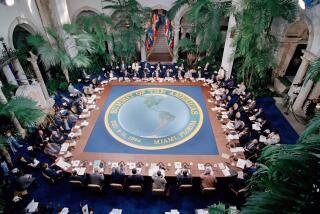PACIFIC PERSPECTIVE: THE BUSH/KAIFU SUMMIT : A Japan That Actually May Say <i> No</i> : Deja Vu and Disaster
TOKYO — Six years ago Southern California was the site of another U.S.-Japan summit. That meeting launched the celebrated MOSS (Market-Oriented Sector-Selective) talks aimed at solving U.S. trade problems with Japan. This was followed by the Plaza Accord, Section 301 (unfair trade) cases, Japanese “market opening” initiatives and an interminable list of sectoral and product-specific negotiations.
The Bush Administration followed suit in 1989 with Super 301 cases and the Structural Impediments Initiatives. The SII final report in June, 1990, was hailed by the Administration as a “historic” agreement that would, for the first time, truly open the Japanese market.
Who’s kidding whom? Years of “market opening” trade negotiations and laissez faire dogma have left the U.S. economy in shambles.
To create a more equitable, stable and constructive bilateral relationship, we must strengthen our industrial competitiveness, formulate a Japan trade policy and undertake a fundamental reassessment of the U.S.-Japan relationship.
More to Read
Sign up for Essential California
The most important California stories and recommendations in your inbox every morning.
You may occasionally receive promotional content from the Los Angeles Times.










